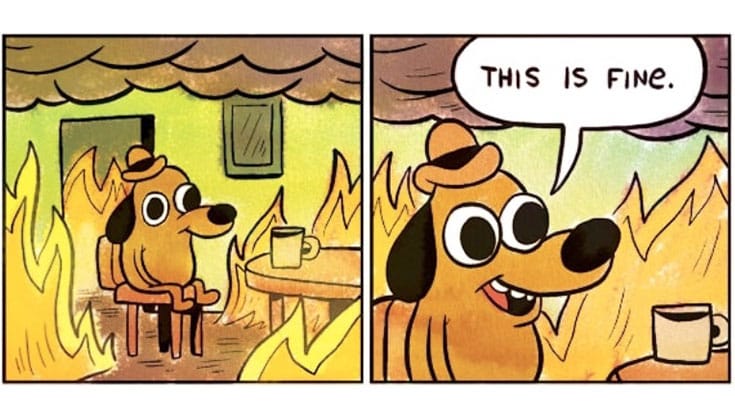Looking at the steady stream of troubling U.S. news, I see what looks to me like the beginning of a civil war — or at least the ruthless side-taking and sloganeering that comes with one. Likewise, deep inside, I feel darkly divided.
On one hand, I’m a Buddhist, and that means that I take seriously ideas like interdependence, impermanence, compassion, and basic goodness. And working to bring these ideas forward in my mind and heart is also important.
On the other hand, I’m cynical. Light-heartedly nihilist in a way that’s common to the internet age, I suppose, but also not so lightheartedly. A seriously “dark comedy” kind of guy.
It is a real fight these days to not let that guy take over.
Since the Trump win happened, I’ve been reading, writing, social-media’ing all about it, and working with Buddhist colleagues to get their timely counsel out there. It helps, not feeling complacent. But I can’t lie: with each new heartbreaking story of Trump-inspired violence, or of disarray among his transition team, or of his positions and staff picks, has come new reason, so far as I’ve been concerned, to lose hope that things could turn around. It’s all beyond belief. I’ve been functioning, but with a heavy, despondent heart.
This darkness, this cynicism, this sense of deep not-okayness we can feel is not an entirely bad thing.
And then, last night, through my Facebook feed came a story about Stephen Hawking’s assertion that the only way humanity could survive is to colonize Mars or whatever planet we can, and that we only have a thousand years to do it. And I thought, for real: “Survive? For what?”
I looked at my partner and ranted: “Can’t we just let it go? Can’t we as a species just call it a day, realize that we’re on our way out and take care of each other ‘til it’s over? Wouldn’t that be better?” Instantly, I couldn’t believe I had actually, so seriously, advocated for the end of everything.
And then she said, “I think so.”
And the way she said it, there was a tender realness there that flagged for me something I must really remember, and return to: that this darkness, this cynicism, this sense of deep not-okayness that we can feel is not an entirely bad thing.
Oh, don’t get me wrong: it’d be best if that deep not-okayness wasn’t there at all. And that’s the pinnacle of the Buddhist endeavor, of course: the end of suffering. The end of the cause of it, the end of the effects of it.
To want for the absence of suffering — for oneself, for others — is an elevated impulse, and one we must uphold as such. You can’t live in true peace, or lead people to it, without it. So when it appears that our (meaning, humanity’s) leaders are without it, how are we not supposed to feel that we’re being led hopelessly, lovelessly into oblivion?
I don’t want to live feeling like that, not if I don’t have to. But the nihilist inside me isn’t going anywhere, and I’m hardly at any pinnacle. What can be done?
Practice. Yes, I’m talking about meditation. But, as easy and tempting as it is, we can’t just talk about it. We have to do it. (Though, please, if you have reason to believe you’re depressed or are otherwise grappling with psychological challenges that should be professionally addressed, tend to that before taking up meditation.) And, if meditation’s just not gonna happen, do something, anything that gives you a wholesome respite from the bad news, which I guarantee will be there for you tomorrow. Get some exercise. Take real time away from Facebook (or whatever you’re compulsively doing) and get some perspective that isn’t driven by clicks—or any other transaction. Or try working with intention, cultivating the altruism and connection that are so fundamental and restorative to our equanimity and happiness. To keep calm (or maintain righteous anger!) and carry on in times of worry and dread, we have to make time and space to let our minds stretch beyond the constricted, circular thinking of worry and dread.
If we identify with what constricts us, we start to think that’s all there is. That’s a death of sorts, to think that way, and frankly, I’ve been feeling a bit dead. But as the Zen teacher Josh Bartok recently wrote to me, “We are NOT our thoughts. (Nor our bodies, emotions, volitions, sensations, or consciousness). This is the great liberation.”
So we don’t have to deny that we’re feeling hopeless. We just have to know that how we feel is by no means the whole story: liberation is present, too.
If we’re bereft about the deficit of love and decency in the world, and if our leaders are devoid of those things too, all we can do is try to make up the difference.
If everything’s going to hell anyway, then why the hell not? Until we get to Mars, it’s the only chance we’ve got.
Practices and teaching that can help
This site is loaded with helpful guidance related to Buddhist practice and thought about caring for ourselves and others. Here are a few articles to get you started. May they be of benefit.
https://www.lionsroar.com/meditation-be-kind-to-yourself/
https://www.lionsroar.com/generositys-perfection/
https://www.lionsroar.com/how-to-establish-a-daily-practice-of-almost-anything-in-six-steps/
https://www.lionsroar.com/i-vow-not-to-burn-out/
https://www.lionsroar.com/she-who-hears-the-cries-of-the-world/
https://www.lionsroar.com/enter-the-bodhisattva-november-2012/
https://www.lionsroar.com/love-everyone-a-guide-for-spiritual-activists/
https://www.lionsroar.com/commentary-why-this-gay-buddhist-teacher-is-dubious-about-buddhist-refuge-in-the-trump-era/
https://www.lionsroar.com/set-your-intention-rejoice-in-your-day/
https://www.lionsroar.com/developing-the-mind-of-great-capacity/
https://www.lionsroar.com/you-can-do-it-november-2012/
https://www.lionsroar.com/pema-chodrons-three-methods-for-working-with-chaos/
https://www.lionsroar.com/i-want-to-be-loving-july-2012/

